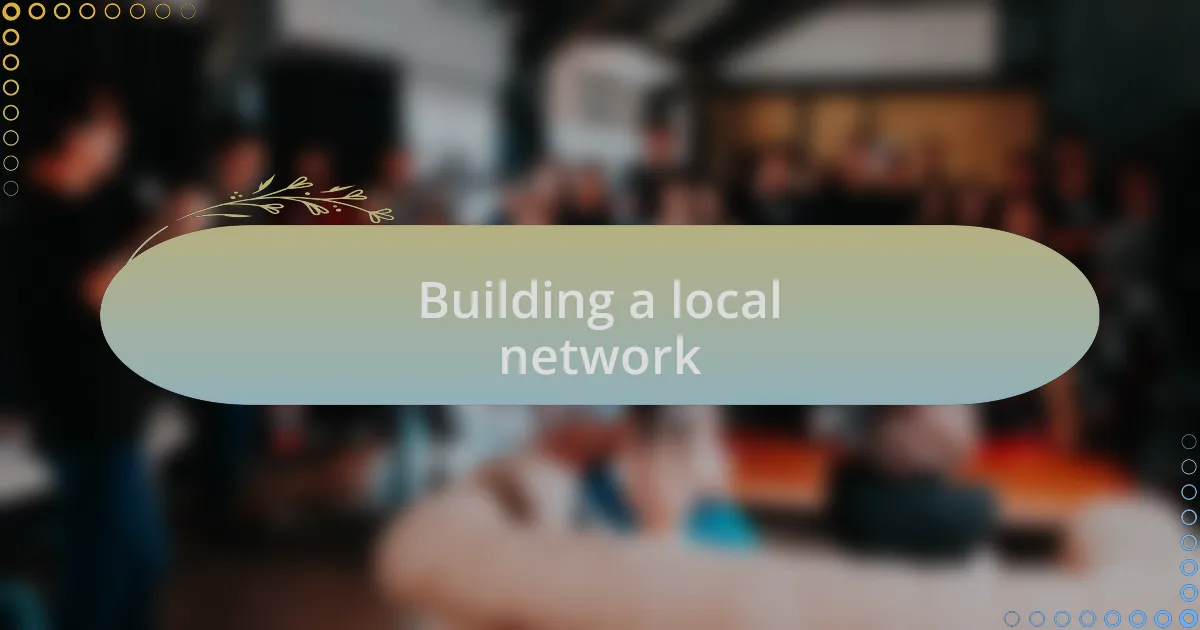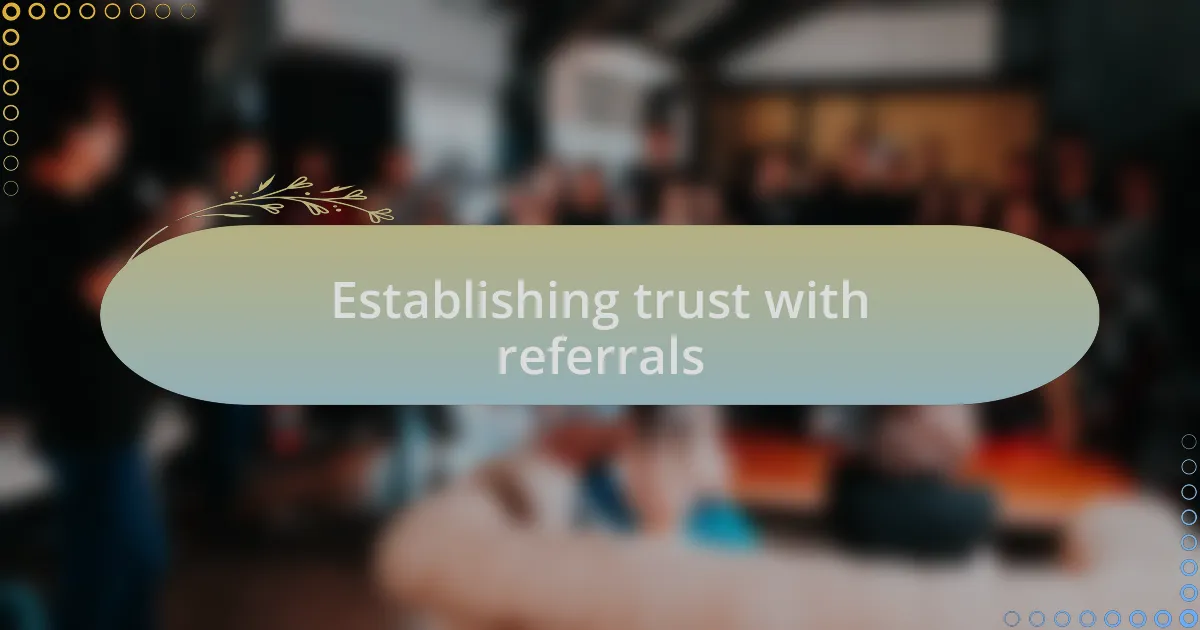Key takeaways:
- Business referrals symbolize trust and can lead to lasting partnerships, enhancing credibility and network expansion.
- Quality referrals are crucial for building a solid reputation and generating meaningful conversations that foster growth.
- Identifying potential referral sources requires understanding community dynamics and leveraging existing relationships.
- Establishing trust through credibility and transparent communication is essential for nurturing valuable connections and improving referral outcomes.

Understanding business referrals
Business referrals are not just recommendations; they represent trust and validation within a community. When someone refers a customer to your business, they are essentially putting their credibility on the line, which speaks volumes about the quality of your services. I remember a time when a former colleague referred a client to me without hesitation, and that level of trust felt incredibly rewarding.
Think about it: when you receive a referral, you’re not just gaining a potential customer; you’re also tapping into an existing relationship. This connection often leads to a warmer welcome than if you were approaching someone cold. I’ve always found that the best referrals come from those who genuinely believe in what I do, which makes those connections feel more significant and impactful.
Moreover, a quality referral isn’t just about the potential for sales; it’s about the potential for meaningful partnerships and collaborations that can elevate your business. I often ask myself, “How can this referral help cultivate a long-lasting relationship?” By focusing on the deeper connections and shared values within these referrals, I find that they lead to more than just transactions—they open doors to thriving partnerships.

Importance of quality referrals
Quality referrals hold immense importance in the realm of local business networking. They are often the key to unlocking new opportunities that would otherwise remain inaccessible. I recall an instance when a trusted friend referred me to a local nonprofit needing marketing services. This referral didn’t just lead to a project; it blossomed into a long-term relationship that has brought mutual benefits over the years.
When I consider the value of quality referrals, the idea of trust emerges as a fundamental pillar. I’ve had potential clients who felt at ease simply because they were introduced to me by someone they valued. Have you ever experienced a situation where a referral made you feel more confident entering a new relationship? It creates an immediate bond, doesn’t it? The right referral can pave the way for meaningful conversations that otherwise might never happen.
Additionally, the significance of quality referrals can’t be overstated when it comes to building a solid reputation. Each positive experience stemming from a referral reinforces not just the individual relationship but your standing in the community as well. I remember how one positive referral led to a chain reaction—one satisfied client introduced me to another, and before I knew it, I had expanded my network significantly. Quality referrals are truly the lifeblood of local businesses, nurturing growth in ways that cold outreach simply can’t match.

Identifying potential referral sources
Identifying potential referral sources starts with understanding the landscape of your local community. For instance, when I first began networking, I closely observed nearby businesses, pinpointing those that shared a customer base. Have you noticed how certain industries naturally align? Collaborating with complementary businesses can yield fruitful referral opportunities, forming a network that benefits everyone involved.
Another effective strategy is leveraging existing relationships to uncover referral sources. I’ve often reached out to my past clients to gauge if they know anyone who could benefit from my services. It’s fascinating how a simple conversation can reveal connections I hadn’t even considered before. So, have you ever thought about tapping into your own network for potential opportunities? It’s a gold mine waiting to be explored.
Finally, actively engaging in local community events can unveil hidden referral sources. When I attend such gatherings, I make a point to initiate conversations, not just with business owners but also with patrons. I once struck up a conversation with someone at a local fair who ended up referring me to a friend in need of my expertise. Engaging with the community opens doors and showcases your willingness to be part of the local fabric. Remember, every interaction counts, often in ways we can’t anticipate.

Building a local network
Building a local network requires genuine relationships and consistent effort. I remember attending a small business expo where I didn’t just hand out my business cards; I took the time to learn each vendor’s story. Isn’t it amazing how a simple exchange can evolve into fruitful connections? Investing that kind of time often leads to authentic partnerships.
Participating in local organizations has also been a game changer for me. Joining the Chamber of Commerce connected me with entrepreneurs who share similar challenges. I recall a group meeting where a member openly discussed their struggles and how my services could alleviate them. Have you ever thought about how shared experiences can foster trust? In my experience, being open and sharing your own journey helps build a network of support you might not expect.
Moreover, I’ve found that social media platforms, particularly those focused on local communities, can be invaluable. By sharing insights and engaging with others online, I’ve developed connections that translate into real-world referrals. It’s intriguing how digital interactions can lead to tangible relationships, isn’t it? You never know when a simple post or comment will spark a conversation that enhances your networking efforts, broadening your local reach.

Evaluating referral quality
Evaluating referral quality starts with understanding the source of the referral. I typically ask myself, “What is the referrer’s relationship with the potential client?” A warm introduction from someone who knows both parties well can be far more valuable than a cold lead. Just last month, a business owner I met referred me to a corporate client, knowing the client needed services I provide. This connection felt solid since the referrer had firsthand experience with my work.
Next, I focus on the specifics of the referral. Are they looking for exactly what I offer? One time, I received a referral meant for a completely different industry. While flattering, it wasted both our time. By assessing whether the referral aligns closely with my services, I can better gauge its potential impact. It’s crucial to ask open-ended questions to elicit important details, ensuring that the referral is not just a name but a thoughtful introduction that leads to meaningful dialogue.
Lastly, I consider the urgency behind the referral. A prospect who is actively looking will likely require a faster response than someone who is simply exploring options. I recall a referral that came with a sense of urgency; we connected within hours and ultimately sealed the deal. This experience taught me that evaluating the timing of a referral can significantly influence my approach and, consequently, the outcome. Have you ever felt the thrill of acting swiftly on a lead and seeing immediate results? It’s exhilarating and reinforces why assessing referral quality is so important.

Establishing trust with referrals
Establishing trust with referrals is foundational for nurturing valuable connections. I remember when a colleague referred me to a client they had worked with for years; it felt like receiving a seal of approval. Their confidence in me made all the difference, turning that referral into a successful partnership. Trust opens doors.
The quality of a referral often hinges on the credibility of the referrer. When I receive a recommendation from someone who has experienced my service, it creates an inherent trust. This dynamic was clear when a fellow marketer sent a potential client my way after being delighted by my consultation. As soon as I reached out, the client was already inclined to trust me, which made our initial conversation feel like a continuation of a established connection rather than a cold call. Isn’t it amazing how trust can set the stage for a fruitful relationship?
Lastly, I find that transparent communication fosters trust. When discussing referrals, I’m always clear about my capabilities and what I can deliver. Just recently, I engaged with a referral by openly sharing my process and how I could meet their needs. This honesty not only built rapport but also reassured the client that they were making the right choice. So, how transparent are you when discussing potential referrals? You might be surprised at how it deepens trust.
![]()
Tracking and improving referral outcomes
Tracking and analyzing referral outcomes is essential to refining your networking strategy. I once realized the power of metrics when I began documenting how many leads converted into paying clients from specific referrals. It was enlightening to see that certain sources yielded high-quality leads consistently, while others didn’t perform as expected. Have you ever wondered how data can reshape your approach?
To improve these outcomes, I recommend regularly revisiting your referral process. I did this by implementing feedback loops with those who referred clients to me. Not only did it help me understand their expectations, but it also highlighted areas for improvement. It truly transformed my approach to referrals—have you considered what insights you might uncover from those conversations?
Another tactic I’ve embraced is setting goals for referral generations, which allows me to measure progress. For example, I set a goal to increase my referral-based clients by 25% last quarter. By aligning my networking efforts with this objective, I found myself being more intentional in conversations. It’s remarkable how a clear target can sharpen your focus—have you set any referral goals that could create a similar motivational drive for you?